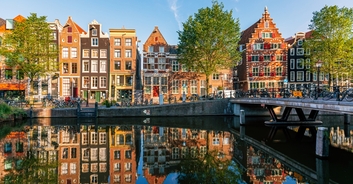Advertising is a truly pervasive force in our lives. From the moment you touch down in almost any country in the world, posters leer, screens stare and roadside billboards pick out your insecurities from 100 feet away. With the explosion of digital media, online advertising is a billion-dollar industry which invades our beloved smart devices on a daily basis.
However, it is out-of-home advertising - which occupies space, obscures vistas and drowns buildings with marketing messages - which has been taking a beating. There’s a chance you’ve seen a result of this new war on adverts. Or perhaps passed one, without noticing.
From Madrid to Los Angeles, adverts are being covered, rearranged and replaced. Dubbed “subvertising”, this is the practice of reclaiming advertising space - sometimes covering adverts with art, sometimes using an existing advert’s colour palate, logos and lettering to tell a different story.
There are a number of covert subvertising organisations with differing aims. Speaking to VT, London-based Special Patrol Group explained their ultimate objective as "the destruction of capitalism and the immediate disbandedment [sic] of the Metropolitan Police Force".
To find out more about the movement, I got in touch Brandalism - an international organisation committed to reclaiming public spaces. Ever topical, a recent project targeted the monarchy on the day of the royal wedding.
Brandalism's co-founder agreed to an interview and, in an East London café, I met a man who wouldn’t tell me his real name but goes by the moniker of “Bill Posters”.
VT: How did you first find out about subvertising and what drew you to it?
"My background, 10 or 12 years ago, was graffiti and street art. Painting trains. Painting rooftops. I’ve always been interested in the way that artists have challenged corruption - corporations and politicians and the way that activism can be used. I think the major turning point was the Iraq war because, for the first time in my lived experience, it was a blatantly deceptive, illegal war. So the approach for subvertising was - if you’re a graffiti writer and you’ve got access to public space and you’ve got the DIY skills and the nuts to go into public space and write your name everywhere and reclaim that space as an individual. But I was thinking surely we can reclaim that public space for something social to communicate with a bigger audience than just your graffiti crews and the graffiti community and getting out of that stylised co-defined language."
VT: So it’s less about pursuing your own aims?
"It’s less about the individual. It’s about bigger-than-self things because I think that in the age that we’re alive in now, as artists, you’ve got to be about so much more than the individual and the aesthetic, surely? If you look back in history and you see the relationship between art and social development, it plays a massive role and at the minute, if you look at culture, most of that is commercial now."
VT: So presumably you’ve done subvertising yourself?
"When things started to get serious and subvertising started to take off, there were a few different groups and artists in different countries working out the same kinds of problems as to how to access these spaces. To get into a 48-sheet billboard you need a lot of gear. It’s not very accessible. But bus stop ads? They’re six-sheet posters on every street corner in every major city across the world. Super accessible. So there was a couple of different collectives and crews that were working on the keys for them for access. Then there was a hashtag thread - #YeahWeGotKeysForThat - and that was tracking the developments of figuring out, learning and sharing the different keys. So an artist called Jordan Seiler in the US made a little website with different types of locks for different ad spaces in different countries. So it’s like a world map."
VT: How many people are in the Brandalism network?
"We’ve got a crew in the UK that’s in three main cities so Manchester, Bristol, London and again, our team fluctuates. But there is a core team that’s working on it but I wouldn’t like to say exactly how many because you have to be a bit sensitive."
“For about £8, you can access around 100,000 ad spaces across the whole of western Europe”
VT: And Brandalism has done workshops on this to teach other people the skills?
"We train anyone really. Anyone or any group. Especially campaign groups that want to get their messages out in public space. So we run skillshares - ad hack workshops where people learn about the theory - about the reasons behind it and why it’s important to take back that space - but also the practical elements so how to use the keys, how to simulate the workers’ uniforms, how to print your artworks…"
VT: And these keys that you’ve mentioned?
"When you get into it, it’s really simple. For about £8, you can access around 100,000 ad spaces across the whole of western Europe basically, thanks to globalisation and the standardisation of these big four outdoor ad companies [...] It’s two keys mainly, then you can access over 100,000 spaces."
VT: It seems like a military operation. Was it always like this?
"It’s not rocket science. It’s more of a military operation if you’ve got your spray paint and you’re going into a train yard at three in the morning because then you have to be clocking security, seeing where the train guards are moving, seeing where the cleaning staff are, you have to be cutting through fences or going through the ventilation shafts into the subway network or into the tube network, you have to have keys for doors potentially, you have to know where the layups are. That is a military incursion. Whereas opening those spaces in the streets is easy. You just buy a key for £3."
VT: Do you know anyone who’s been caught?
"Nope. And for example, we hacked 600 ad spaces in Paris. JCDecaux [one of the largest providers of advertising space] were a golden sponsor for the climate talks - it was their big moment to shine. And we were making the link between advertising and consumers and climate change right there with all the world’s media on it. So actually, the brand damage at that key moment, through press exposure, was massive. The loss of revenue, potentially, for 600 spaces when you can imagine what the tariff would have been for those spaces in the city centre that week? So it’s high figures but the industries don’t want to add oxygen to the fire. They didn’t want to step into that territory because if they’d prosecuted, it would’ve created all these conversations - all these dialogues - because that’s what it’s about."
“The most intelligent, creative minds are being used to sell fridges and dishwashers and bleach”
VT: You reached out to people working in advertising. How did this work?
"Advertising has always been a part of human culture but the pervasiveness and the role now that it takes in human culture has never been on this scale before. So it’s a really interesting time and we need to remember that although we are critical of that and the role that some corporations and their corporate culture play and the effect that has on society, the environment and our individual selves, it’s really important to remember that the workers who work in these companies are some of the most creative, brilliant minds. They go straight from university into these high paid jobs in advertising and PR. The corporate communications sector has the roles that attract the brightest talent. So we have solidarity with those workers because we’re workers as well. We know how creative they are as individuals. We also know from the 300+ people that got in touch with us when we launched the Switch Sides campaign. We got long letters and emails that came in saying 'man, I’ve been in this job five years and I can’t get out of it.' For that project, we detourned or subverted the industry practice of direct mailing. We direct-marketed these Rise Up printed brochures and mailed them to the top 500 creatives in advertising in the UK - hand-dropped by couriers and personalised. And we got all these responses like 'I’m now a strategic planner, I’ve been in the industry for 10 years. I’ve got a wife and a mortgage and I literally can’t do anything else.' It’s suffocating. Because the most intelligent, creative minds are being used to sell fridges and dishwashers and bleach."
VT: Do you think advertising is inherently evil or just something that’s turned sour?
"It’s not a dichotomy between good and evil. It’s not that polarised. As artists, we want to try and understand the world that we’re in and the culture that we’re a part of and the way that culture’s created. And if you look at the communications sector, they are the ones that have control and power to the main narratives and the culture that exists today. So we need to challenge that. So is it unethical? I think that might be the best way to describe it. Does advertising and corporate communications have a role to play in some of the detrimental aspects of capitalism? Does it affect people in a negative way? Does it affect society in a negative way? Does it affect the environment in a negative way? It’s not inherently corrupt or evil but there are questions that need to be asked when we look back through history. Public relations was essentially a peacetime form of propaganda because of the industrial capacity which was left in the States after the war. They needed to sell the stuff that they had the capacity to produce. So Edward Bernays comes along, among others, forms public relations based off Freud’s psychoanalytical studies of human behaviour and essentially weaponises culture."
VT: What is the ultimate aim?
"We’d like to see more people taking part in subvertising and putting art in public space. We want to see cities being co-designed and co-created by the people that live there and that means that more people have access to share their messages and to create art in public space. One way we do that is to work with people in the city and open up ad spaces. So it’s just the form that we use to bring about a more collective ownership and distribution of power down to the people that live in the city."
VT: Speaking of redistribution of power, what’s the agenda? Is it anti-capitalism, socialism, anarchy?
"All those three ideologies are in some way interconnected and intertwined and overlap. I think it’s definitely anti-capitalist. Because capitalism has had its uses but if you look at the wake of destruction it also leaves in its path, it’s obvious that that system is defunct morally and economically. Actually, it’s failing. So we need something to replace it quickly. You can see that across the globe. You can see that from the financial crisis that happened in 2008 and the other subsequent financial crises that will happen. The amount of trillions that have been pumped in to keep it going but it’s on life support so we need something new. So yes, anti-capitalist, definitely [...] It’s not so much what we’re against - because that position of anti that you said is anti-capitalist. We know what we’re against. The biggest projects that we’ve done have highlighted and raised awareness of those issues that are all intertwined when it comes to consumers and corporate communications. What we’re now about is what we want to see next. So we want to see the alternatives. How can we work with artists internationally to highlight the alternatives that already exist and use art as an engagement mechanism to raise awareness of that?"
"It's evident from history that you don't get additional rights unless you break laws"
VT: What do you say to people who state that this is simply vandalism masquerading as activism?
"If you look back at any civil rights movement throughout history and you look at the relationship with the hard-fought developments - the right to vote for women, the right not to be segregated if you're black - if you look at any of those movements, the thing they've got in common is civil disobedience which, by definition, involves some form of rule-breaking. It's evident from history that you don't get additional rights unless you break laws and fight for them. Until it reaches a critical mass and a tipping point, it's a normal part of that struggle. So yeah, there's an element of civil disobedience to what we're doing because you have to break laws to create space for these alternative messages and ideas."
It certainly follows that an artist would want to showcase their work in an advertising space. Carefully picked for maximum exposure, we tend to simply accept the screens, posters and billboards as "the way it is". However, subvertising should act as a reminder of the silent resistance - the many men and women who don't accept the status quo and instead fight against it.
Brandalism have released a Subvertising Manual, published through Dog Section Press, which is available for £3.
Illustrations by Egarcigu












